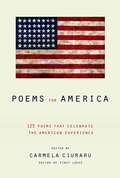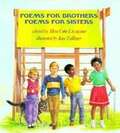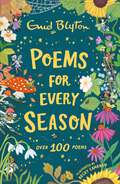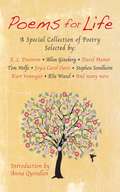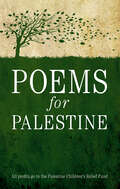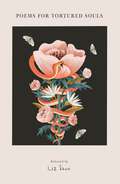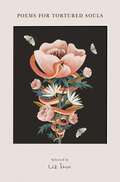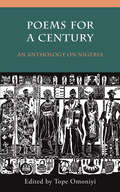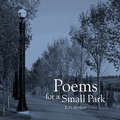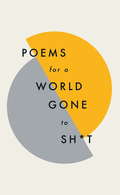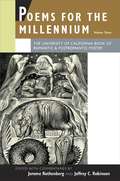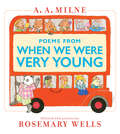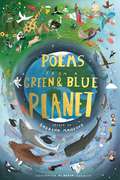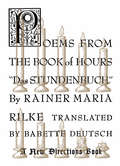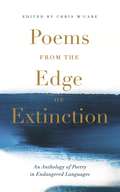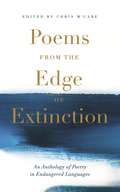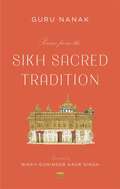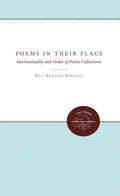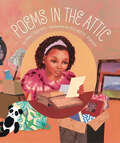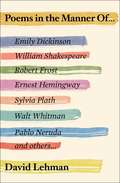- Table View
- List View
Poems for America
by Carmela CiuraruAn inspiring anthology that celebrates our nation with more than one hundred of the greatest poems ever written about the landscapes, institutions, and transforming events of America. This remarkable volume commemorates our country's struggles and triumphs with poems chronicling the American experience in all its vastness, from the late seventeenth century through the present day. Alongside poems about New York, Florida, and California are descriptions of railroads, amusement parks, hotels, and road trips; scenes of rural and western life; vivid descriptions of our grandest cities; and poems that illuminate the complexity of the most shameful chapters in U. S. history, such as slavery and the oppression of Native Americans. Taken together, these poems -- whether voices of celebration or dissent -- honor the astonishing and enduring spirit of our nation. Here are classics such as "The Battle Hymn of the Republic," "Crossing Brooklyn Ferry," and "Paul Revere's Ride"; works by American masters, including Emily Dickinson, Robert Frost, Wallace Stevens, Marianne Moore, Langston Hughes, and Elizabeth Bishop; and lesser-known gems by important American writers, such as Ernest Hemingway's "I Like Americans" and Henry David Thoreau's "Our Country. " Also featured are poems by contemporary talents, including Richard Wilbur, Philip Levine, Adrienne Rich, Yusef Komunyakaa, Rita Dove, and Sherman Alexie. A timeless volume that traces the history of the United States through verse, Poems for America is essential for poetry lovers and for anyone who appreciates the rich and fascinating story of our nation.
Poems for Brothers, Poems for Sisters
by Myra Cohn LivingstonBig sisters, little sisters, big brothers,little brothers, brothers who bring home oranges, sisters who have blisters . . . Here are nineteen humorous and serious poems-some of them commissioned from Julia Cunningham, Emanuel di Pasquale and other contemporary poets- about siblings of all kinds.
Poems for Every Season
by Enid BlytonWith over 100 nature poems, this gorgeous collection is an exciting celebration of the natural world and its wonders from Enid Blyton, the world's best-loved storyteller. From birds in May and August flowers to green trees in November and summer seaside walks, explore the enchanting worlds of animals, birds, trees and plants throughout the year in verse.Beautifully illustrated throughout by Becky Cameron, this enchanting poetry book is the perfect gift to read throughout the year and will delight all nature lovers.
Poems for Every Season
by Enid BlytonWith over 100 nature poems, this gorgeous collection is an exciting celebration of the natural world and its wonders from Enid Blyton, the world's best-loved storyteller. From birds in May and August flowers to green trees in November and summer seaside walks, explore the enchanting worlds of animals, birds, trees and plants throughout the year in verse.Beautifully illustrated throughout by Becky Cameron, this enchanting poetry book is the perfect gift to read throughout the year and will delight all nature lovers.
Poems for Life: Celebrities on the Poems they Love
by Anna QuindlenWhat is your favorite poem? That is the question students from two fifth-grade classes at a New York grade school asked famous people to whom they had written. Their idea, the students explained, was to put together a book that would benefit the Women's Commission for Refugee Women and Children. The students were also studying poems in class and wanted to know if anybody still, in fact, read and gained insight from poetry. Touched by this appeal to their hearts, minds, and memories, fifty celebrities responded to their inquiries, including Geraldine Ferraro, Allen Ginsberg, Rudi Giuliani, Peter Jennings, Angela Lansbury, Yo-Yo Ma, Isabella Rossellini, Diane Sawyer, Ally Sheedy, Kurt Vonnegut, and Tom Wolfe. The poems they offer range from John Donne to Langston Hughes, but their letters all express hope that the students-and readers of this wonderful gift book-will read and take inspiration from the poetry of past and present."Of all the words that have stuck to the ribs of my soul, poetry has been the most filling," writes Anna Quindlen in her introduction, and this beautiful, inspiring collection of poetry is the perfect expression of how poets can influence and shape our lives.
Poems for Palestine
by Maher MassisAn anthology of poems dedicated to the people of Palestine and their long struggle for freedom"Poems for Palestine" was launched as a project aiming to collect together verse written by the people of Palestine, as a website open to all comers, all free to upload their work. The broad spectrum of the resulting talent displays a multitude of different poetic styles, subject matters, and emotions. The role of art, and poetry in particular, as a cathartic healer is crucial to this venture— the poems are in turn full of anguish, emotion, longing, and love. In an age which sees a multitude of conflicts all over the world, it is important to make sure that we do not forget to listen to the voices of those affected. Too many people live in danger, in exile, or in despair today, and this project may well serve as a refrain for displaced people, from war-torn countries all over the word.
Poems for Tortured Souls
by Liz IsonDear Reader, these poems are an introduction to the passionate words of some of the English language's most renowned poets. Inspired by today's greatest lyricist, Taylor Swift, this collection overflows with folklore, love, heartache, revenge and peace - the perfect balm for any tortured soul.Featuring poems by William Wordsworth, Emily Dickinson, Elizabeth Barrett Browning, William Shakespeare, Lewis Carroll and many more, this moody and melancholy anthology celebrates the most famous - and tortured - poets. WARNING: These poems might make you cry!
Poems for Tortured Souls
by Liz IsonDear Reader, these poems are an introduction to the passionate words of some of the English language's most renowned poets. Inspired by today's greatest lyricist, Taylor Swift, this collection overflows with folklore, love, heartache, revenge and peace - the perfect balm for any tortured soul.Featuring poems by William Wordsworth, Emily Dickinson, Elizabeth Barrett Browning, William Shakespeare, Lewis Carroll and many more, this moody and melancholy anthology celebrates the most famous - and tortured - poets. WARNING: These poems might make you cry!
Poems for Tortured Souls
by Liz IsonSoothe your spirit with this emotional, romantic, must-have collection, an homage to some of the poets and writers who have inspired Taylor Swift. This collection of timeless poems is a beautiful introduction to the passionate words that have inspired artists and lyricists for generations. Discover poetry that overflows with folklore, love, heartbreak, revenge, and peace – the perfect balm for any tortured soul. Featuring poems by Edna St. Vincent Millay, Emily Dickinson, William Shakespeare, Elizabeth Barrett Browning, Lewis Carroll and more, this moody and melancholy anthology celebrates the English language&’s most famous poets, and the emotions that unite us. Warning: these poems might make you cry!
Poems for a Century: An Anthology on Nigeria
by Ifi Amadiume Tade Akin Aina Sumaila Umaisha Toyin Adewale-Gabriel Okinba Launko Afam Akeh Femi Oyebode Amatoritsero Ede Peter Akinlabi Tanure Ojaide Zainabu Jallo Richard Ali Ismail Bala Obi Nwakanma Adebayo Lamikanra Hope Eghagha Funso Aiyejina Jekwu Ozoemene Ogaga Ifowodo Chidi Anthony Opara Sulaiman Adebowale Kole Ade-Odutola Uzor Maxim Uzoatu E. E. Sule Akeem Lasisi Olajumoke Verissimo Cyril Obi Tolu Ogunlesi Omohan Ebhodaghe Tope Omoniyi John Pepper Clark Olu Oguibe Uche Nduka Remi Raji Molara A32 Prince Abiathar Zadok Molara Wood WoodIn 2010, billions of naira were spent to celebrate the 50th anniversary of Nigeria's independence since 1960. More naira are to be spent in 2014 to commemorate the centenary marking the nation's birth in 1914 from an amalgamation of diverse group of peoples, languages, cultures and expectations. As the conscience of the nation, writers are calling for a deeper introspection. A hundred years after unification, the most populous African nation has oscillated from being great to being fickle, from colony to independence and dependency, from peace to war to ungraceful insecurity, from military dictatorship to civilian oppression and profligacy and much more of the many contradictions of a complex national polity. In this special collection Poems for a Century: An Anthology on Nigeria, poets from different backgrounds, generations and persuasions explore what it means to be a citizen of this unique African country. Shifting from despair to hope, lamentation to happiness, condemnation to adoration and every gamut of sensibilities imaginable, the contributors reiterate the notion of engagement and the power of the written word to push for social change in their beloved nation. In fifty poems, Nigeria becomes the muse not just to raise questions about its past experiences and present contexts, but also to posit aspirations for a better nation.
Poems for a Small Park
by E. D. BlodgettIn this collection by the well-known Edmonton poet, E.D. Blodgett, is an ode to the wisdom and divinity of silence. The poet muses on the quiet of the outdoors and the mysterious relationship that exists between spaces of silence within a city's limits. Most of the short lyrics that make up this sublime collection were written first in English and French before being translated into Cree, Michif, Chinese, and Ukrainian to reflect Edmonton's multicultural past and present. Together they form a composite view of the people and culture that inhabit the city's natural spaces.
Poems for a world gone to sh*t: the amazing power of poetry to make even the most f**ked up times feel better
by Quercus PoetryDISCOVER THE AMAZING POWER OF POETRY TO MAKE EVEN THE MOST F**KED UP TIMES FEEL BETTERA beautiful little book of short, simple, classic and contemporary poems to dip into, to make life feel better.From Shakespeare and Shelley to Lemn Sissay and Kate Tempest, poets have always been the best at showing us we're not alone, however sh*t things might seem.Funny, reflective, romantic and life-affirming - here is an anthology of poems to remind you to keep on looking at the stars: from that first 'what the f*ck' moment to empowering you to do something about this sh*t and ultimately realising that life is still beautiful after all.Rediscover old favourites and find some new treasures - you might be surprised just how much poetry can help. For fans of The Poetry Pharmacy, The Reading Cure and The Emergency Poet.
Poems for a world gone to sh*t: the amazing power of poetry to make even the most f**ked up times feel better
by Various Poets Quercus PoetryDISCOVER THE AMAZING POWER OF POETRY TO MAKE EVEN THE MOST F**KED UP TIMES FEEL BETTERA beautiful little book of short, simple, classic and contemporary poems to dip into, to make life feel better.From Shakespeare and Shelley to Lemn Sissay and Kate Tempest, poets have always been the best at showing us we're not alone, however sh*t things might seem.Funny, reflective, romantic and life-affirming - here is an anthology of poems to remind you to keep on looking at the stars: from that first 'what the f*ck' moment to empowering you to do something about this sh*t and ultimately realising that life is still beautiful after all.Rediscover old favourites and find some new treasures - you might be surprised just how much poetry can help. For fans of The Poetry Pharmacy, The Reading Cure and The Emergency Poet.
Poems for the Millennium: The University of California Book of Romantic and Postromantic Poetry
by Jerome Rothenberg Jeffrey C. RobinsonLying behind the present gathering is a sense that the most radical and experimental works of our time--in poetry and across the arts--belong to a continuity that stretches back two centuries and more, along with a presentiment of the dark turn the world has again taken in the new century and millennium opening before us. The time, it seems to us, is ready for a reassessment of where we are and where we've come from--a new mapping that will stress connections, too often denied, while paying equal attention to the conflicts within the lineage we're tracing. At the heart of our imaginings, as we look back over the last two centuries of poetry and life, is a romanticism that can, along with the modernism that follows, still come over--fresh--as an amazing mix of attitudes and directives.
Poems from When We Were Very Young
by A. A. MilneA contemporary master of the nursery tale brings her unique imagination to a beloved classic. First published in 1924—two years before Winnie-the-Pooh—A. A. Milne’s When We Were Very Young is among the most familiar and cherished works in children’s literature. A whimsical celebration of childhood, Milne wrote the collection for his three-year-old son, and the poems have been read and sung to children for decades since. Now, Rosemary Wells brings her signature cast of animal and child characters to a dozen of Milne’s best-loved poems, including “Disobedience,” “The King’s Breakfast,” and “Buckingham Palace” (which stars the one and only Christopher Robin). This musical and memorable edition is by turns traditional and modern, with both delightful charm and wry sensibility.
Poems from a Green and Blue Planet
by Sabrina MahfouzA GUARDIAN CHILDREN'S BOOK OF THE YEAR 2019, this stunning collection of new and classic poems from around the world celebrates the diversity of life on our green and blue planet, to be shared with all the family. With new poems from Raymond Antrobus, Mona Arshi, Kate Tempest, Hollie McNish, Dean Atta, Sabrina Mahfouz and more.Dive into this book and be swept away on a journey around our green and blue planet, from the peak of the snowiest mountaintop to the bottom of the deepest, bluest ocean. Meet the birds circling its skies, the beasts prowling its plains, and the people toiling in its fields and forests and cities... Explore all the worlds that make up our world, and hear the voices, past and present, that sing out from it. From haikus to sonnets, from rap to the Romantics, this joyous collection celebrates life in all corners of our beautiful planet.
Poems from a Green and Blue Planet
by Sabrina MahfouzA GUARDIAN CHILDREN'S BOOK OF THE YEAR 2019, this stunning collection of new and classic poems from around the world celebrates the diversity of life on our green and blue planet, to be shared with all the family. With new poems from Raymond Antrobus, Mona Arshi, Kate Tempest, Hollie McNish, Dean Atta, Sabrina Mahfouz and more.Dive into this book and be swept away on a journey around our green and blue planet, from the peak of the snowiest mountaintop to the bottom of the deepest, bluest ocean. Meet the birds circling its skies, the beasts prowling its plains, and the people toiling in its fields and forests and cities... Explore all the worlds that make up our world, and hear the voices, past and present, that sing out from it. From haikus to sonnets, from rap to the Romantics, this joyous collection celebrates life in all corners of our beautiful planet.
Poems from the Book of Hours
by Rainer Maria Rilke Ursula K. Le Guin Babette DeutschOne of the most powerful poetry collections of the twentieth century, now in a beautiful new edition Although The Book of Hours is the work of Rilke’s youth, it contains the germ of his mature convictions. Written as spontaneously received prayers, these poems celebrate a God who is not the Creator of the Universe but rather humanity itself and, above all, that most intensely conscious part of humanity, the artist. Babette Deutsch’s classic translations—born from “the pure desire to sing what the poet sang” (Ursula K. Le Guin)—capture the rich harmony and suggestive imagery of the originals, transporting the reader to new heights of inspiration and musicality.
Poems from the Edge of Extinction: An Anthology of Poetry in Endangered Languages
by Chris McCabep.p1{margin:0.0px0.0px0.0px0.0px;font:12.0px'HelveticaNeue';color:#454545}The Beautiful New Treasury of Poetry in Endangered Languages, in Association with the National Poetry LibraryFeaturing award-winning poets from cultures as diverse as the Ainu people of Japan to the Zoque of Mexico, with languages that range from the indigenous Ahtna of Alaska to the Shetlandic dialect of Scots, this evocative collection gathers together 50 of the finest poems in endangered, or vulnerable, languages from across the continents. With poems by influential, award-winning poets such as US poet laureate Joy Harjo, Hawad, Valzhyna Mort, and Jackie Kay, this collection offers a unique insight into both languages and poetry, taking the reader on an emotional, life-affirming journey into the cultures of these beautiful languages, celebrating our linguistic diversity and highlighting our commonalities and the fundamental role verbal art plays in human life. Each poem appears in its original form, alongside an English translation, and is accompanied by a commentary about the language, the poet and the poem - in a vibrant celebration of life, diversity, language, and the enduring power of poetry. One language is falling silent every two weeks. Half of the 7,000 languages spoken in the world today will be lost by the end of this century. With the loss of these languages, we also lose the unique poetic traditions of their speakers and writers. This timely anthology is passionately edited by widely published poet and UK National Poetry Librarian, Chris McCabe, who is also the founder of the Endangered Poetry Project, a major project launched by London's Southbank Centre to collect poetry written in the world's disappearing languages, and introduced by Dr Mandana Seyfeddinipur, Director of the Endangered Languages Documentation Programme and the Endangered Languages Archive at SOAS University of London, and Dr Martin Orwin, Senior Lecturer in Somali and Amharic, SOAS University of London. Languages included in the book: Assyrian; Belarusian; Chimiini; Irish Gaelic; Maori; Navajo; Patua; Rotuman; Saami; Scottish Gaelic; Welsh; Yiddish; Zoque Poets included in the book: Joy Harjo; Hawad; Jackie Kay; Aurélia Lassaque; Nineb Lamassu; Gearóid Mac Lochlainn; Valzhyna Mort; Laura Tohe; Taniel Varoujan; Avrom Sutzkever
Poems from the Edge of Extinction: The Beautiful New Treasury of Poetry in Endangered Languages, in Association with the National Poetry Library
by Chris McCabeOne language is falling silent every two weeks. Half of the 7,000 languages spoken in the world today will be lost by the end of this century. With the loss of these languages, we also lose the unique poetic traditions of their speakers and writers.Poems from the Edge of Extinction gathers together 50 poems in languages from around the world that have been identified as endangered; it is a celebration of our linguistic diversity and a reminder of our commonalities and the fundamental role verbal art plays in human life around the world. With poems by influential, award-winning poets such as US poet laureate Joy Harjo, Hawad, Valzhyna Mort, and Jackie Kay, this anthology offers a unique insight into both languages and poetry, taking the reader on an emotional, life-affirming journey into the culture of these beautiful languages.Each poem appears in its original form, alongside an English translation, and is accompanied by a commentary about the language, the poet and the poem - in a vibrant celebration of life, diversity, language, and the enduring power of poetry.This timely collection is passionately edited by widely published poet and UK National Poetry Librarian, Chris McCabe, who is also the founder of the Endangered Poetry Project, a major project launched by London's Southbank Centre to collect poetry in the world's disappearing languages, and introduced by Dr Mandana Seyfeddinipur, Director of the Endangered Languages Documentation Programme and the Endangered Languages Archive at SOAS University of London, and Dr Martin Orwin, Senior Lecturer in Somali and Amharic, SOAS University of London.Languages included in the book: Assyrian; Belarusian; Chimiini; Irish Gaelic; Maori; Navajo; Patua; Rotuman; Saami; Scottish Gaelic; Welsh; Yiddish; Zoque.Poets included in the book: Joy Harjo; Hawad; Jackie Kay; Aurélia Lassaque; Nineb Lamassu; Gearóid Mac Lochlainn; Valzhyna Mort; Laura Tohe; Taniel Varoujan; Avrom Sutzkever.
Poems from the Sikh Sacred Tradition (Murty Classical Library of India #33)
by Guru Nanak“A landmark volume, filled with beautiful renderings of writings from the Guru Granth Sahib.”—Simran Jeet Singh, author of The Light We Give: How Sikh Wisdom Can Transform Your LifeAn exquisite new translation of Guru Nanak’s verses, illuminating the sacred tenets cherished by millions of Sikhs worldwide.Guru Nanak (1469–1539), a native of Panjab, founded the Sikh religion. His vast corpus of nearly a thousand hymns forms the core of the Guru Granth Sahib, the Sikhs’ sacred book of ethics, philosophy, and theology. The scripture was expanded and enriched by his nine successors, and Sikhs continue to revere it today as the embodiment of their tradition.This beautiful new translation by Nikky-Guninder Kaur Singh, a foremost authority on Sikhism, offers a selection of spiritual lyrics composed by Guru Nanak. Here the reader will find the range and depth of his pluralistic vision of the singular divine and discover his central values of equality, inclusivity, and civic action—values that continue to shape the lives of Sikhs worldwide.
Poems in Their Place: Intertextuality and Order of Poetic Collections
by Neil FraistatWith essays by 13 leading scholars, this collection establishes the grounds for a new kind of poetics that considers the poetry book itself -- the concept and the material fact -- as an object of interpretation. The authors argue that the decisions poets make about the presentation of their works play a meaningful role in the poetic process and therefore should figure as part of the reading experience.The common practice of approaching poems chronologically, as they are presented in anthologies or in posthumous editions, has been fostered by the long prevailing tendency of the New Criticism to treat each poem as self-contained. This volume urges the reader to reconsider the most fundamental ways that one reads, teaches, and inteprets poetry.Moving from classical to contemporary poetry, these essays develop a literary history and theory for such a poetics, at the same time providing a generous set of models for a related practical criticism. At the heart of this collection are such issues as order, arrangement, and intertextuality. Reading poems in their place helps to return them to their historical contexts because the book itself has had a particular place in its own culture and society.Originally published in 1987. A UNC Press Enduring Edition -- UNC Press Enduring Editions use the latest in digital technology to make available again books from our distinguished backlist that were previously out of print. These editions are published unaltered from the original, and are presented in affordable paperback formats, bringing readers both historical and cultural value.
Poems in the Attic
by Nikki GrimesAward-winning poet Nikki Grimes presents a tender poetry collection where a young girl learns about her mother, the child of an Air Force serviceman.During a visit to her grandma's house, a young girl discovers a box of poems in the attic, poems written by her mother when she was growing up. Her mother's family often moved around the United States and the world because her mother's father was in the Air Force. Over the years, her mother used poetry to record everything she saw and did in the many places their family lived. Reading the poems and sharing those experiences through her mother's eyes, the young girl feels closer to her mother than ever before. To let her mother know this, she creates a gift: a book with her own poems and copies of her mother's. And when she returns her mother's poems to the box in the attic, she leaves her own poems too, for someone else to find, someday. Using free verse for the young girl's poems and tanka for her mother's, master poet Nikki Grimes creates a tender intergenerational story that speaks to every child's need to hold onto special memories of home, no matter where that place might be.
Poems in the Manner Of
by David LehmanPoems in the Manner Of is an illuminating journey through centuries of writers who continue to influence new work today, including that of respected poet and series editor of The Best American Poetry David Lehman.“Very few writers can actually shape how you see the world. David Lehman is such a writer,” says Robert Olen Butler. Now the Best American Poetry series editor and New School writing professor channels, translates, and imagines a collection of “poems in the manner of” Emily Dickinson, Robert Frost, Shakespeare, W.B. Yeats, Rilke, William Carlos Williams, and more. Lehman has been writing “poems in the manner of” for years, in homage to the poems and people that have left an impression, experimenting with styles and voices that have lingered in his mind. Finally, he has gathered these pieces, creating a striking book of poems that channels poets from Walt Whitman to Sylvia Plath and also calls upon jazz standards, Freudian questionnaires, and astrological profiles for inspiration. Intelligent and sparkling, this is a great gift for poetry fans and a useful resource for creative writers. These are poems of wit and humor but also deep emotion and clear intelligence, informed by Lehman’s genuine and knowledgeable love of poetry and literature. From Catullus and Lady Murasaki to Wordsworth, Neruda, Virginia Woolf, W.H. Auden, and Charles Bukowski, Poems in the Manner Of shows how much life there is in poets of the past. And like Edward Hirsch’s How to Read a Poem and Robert Pinsky’s Singing School, this book gives you more than poetry. Whether you’re reading for pure enjoyment or examining how a poet can use references and influences in their own work, Poems in the Manner Of is a treasure trove of literary pleasures and food for thought.
Poems of Cheer
by Ella Wheeler WilcoxElla Wheeler Wilcox (1850-1919) was an American author and poet. She is known for writing Poems of Passion. Her most remembered poem was "Solitude", which contains the lines: "Laugh, and the world laughs with you; Weep, and you weep alone". Selections in Poems of Cheer include Worth while -- The House of Life -- A Song of Life Prayer -- In the Long Run -- As you go through Life -- Two Sunsets Unrest -- Artist's life -- Nothing but Stones Inevitable -- The Ocean of Song -- "It might have been" -- Momus, God of La
